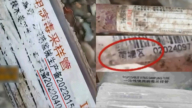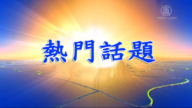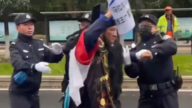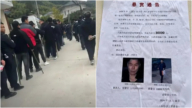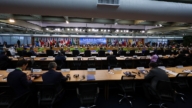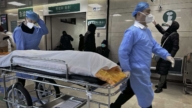【新唐人2011年12月28日訊】以出口為導向的中國經濟,由於通貨膨脹和房地產泡沫的破滅,加上世界經濟形勢影響,迫使中共不斷喊出「擴大內需」的口號。外媒指出,中國「擴大內需」首先應從減稅開始。
12月26號,《路透社》發表「中國擴大內需應減稅先行」 文章。文章認為,「降低增值稅名義稅率,同時取消各種稅收優惠,對擴大內需,提振消費更具長期性﹔而將商品的價內稅改為價外稅,引導產業結構調整或許會有意想不到的功效。」
據中國財政部資料顯示,1-9月全國稅收總收入完成71,292.18億元人民幣,同比增長27.4%。增值稅、營業稅、企業所得稅和個人所得稅,同比分別增長了18.7%、24.0%、35.8%和34.4%。
但是,另一面,私人消費在中國國內生產總值(GDP)中的比重,在過去十年從45%降到現在的33%。相比之下,在大多數經濟體,包括中國的一些東亞鄰國,私人消費佔到GDP的50%左右,個人消費在美國GDP中的比重高達70%。
「美國耶魯大學」管理學院金融學教授陳志武認為,中國國有資產幾乎佔了國家生產性財富的四分之三,在過去30年裡,資產價值增長的大部分都進了國庫。對大部分公民而言,工資增長的速度遠遠慢於國內生產總值。難怪國內消費不能隨GDP相應增長。
陳志武指出:不能還賦予民,不能將財政盈餘通過減稅和退稅轉給家庭,那麼,政府以投資為基礎的刺激計劃,至多只能短暫的促進經濟增長。
可是,中國稅負之高,不僅嚴重影響居民的生活水準,還影響了企業發展。
日前,中共中央黨校國際戰略研究所副所長周天勇在論壇上表示,在增值稅率不降低、小型企業的稅收不降的情況下,如果加強現在的手段法制化的話,對一些民營製造業、小型企業,包括一些服務業,是一個很嚴重的打擊,90%的企業不偷稅、漏稅肯定會倒閉。
不過,知名財經評論家葉檀認為,稅改如果不能突破最大的既得利益階層——各級權力部門的阻力,就難進一步往前。她指出,近十年財政收入大幅增長,主要緣於兩大原因:政府從公共服務型政府向投資型政府轉型﹔公務員隊伍越來越龐大。要減稅負,降低公務員數量是基本前提。
但葉檀對減稅並不樂觀。英國《金融時報》轉載了葉檀的評論,文章指出,到現在為止,沒有手段阻止市場權力部門的無度擴張。而地方政府、權力部門受不到社會輿論監督,必然無度膨脹。
但《路透社》文章透露:中共一直隱瞞消費者現行的價內稅政策。
國家信息中心信息資源開發部主任徐長明以汽車舉例,「比如100萬元的車,4公升以上的發動機排量的車有消費稅40%,現在這個稅是在價內徵收,消費者不知道交40萬的稅。廠家知道,國家知道,但是消費者不知道。如果改成價外稅,很多人可能就不買了。」
經濟時政評論家草庵指出:中共政府一直強調所謂的「效率優先兼顧公平政策」,就是中共政府還是以維護少數人的利益,而不是以公平為主。所以,只有讓中共下臺,解決中共這個獨裁政權,中國百姓才能夠生活在一個幸福、和平、安定的環境。
新唐人記者宋風、王明宇綜合報導。
Foreign Media: Tax Cuts First if China Expanding Domestic Demand
Being an export-oriented economy country, China is affected by
their inflation and real estate crisis as well as the global recessions.
The Chinese Communist Party (CCP) continues to call for
“expansion of domestic demand.”
Foreign media said that China’s “expanding domestic demand”
should start with tax cuts.
On Dec. 26th, Reuters published an article entitled China
expanding domestic demand should be tax cut first.
It said that lowering VAT rates and cancelling various tax
incentives the consumption boost and
expansion of domestic demand will be more long-term.
To modify goods’ that already have tax included in price to
goods’ tax excluded from the price could achieve an unexpected effect for the industrial structure.
Chinese Ministry of Finance data shows that from January
to September,
total tax revenue is 7.1 billion yuan (US$1.12 billion),
an increase of 27.4% year-to-year.
The VAT increased 18.7%, turnover tax increased 24%, and
corporate income tax increased 35.8%.
However, on the other side, personal consumption in GDP
reduced during the past decade from 45% to today’s’ 33%.
In the most countries, including
China’s East Asian border countries,
private consumption accounted for 50% of GDP,
US』s private consumption is up to 70% of GDP.
Chen Zhiwu, a professor at Yale University, school of
Management Finace, believes that China State-owned assets accounted for 3/4 of state productive wealth.
In the past 30 years, most of the growth of assets value
goes into treasury.
For the public, pay raises are far slower than GDP’s growth.
That’s why the domestic consumption can not grow together with GDP.
Chen pointed out that without returning wealth to the people,
without giving back the fiscal surplus to families through the tax cuts and tax return,
the government’s stimulation via an investment-based plan
would only have short-term economic growth.
However, China’s high tax not only affects living standards,
but also affects development of businesses.
Recently, the CCP Central Party School official,
Zhou Tianyong said that without reducing the VAT rate,
without reduction of business tax as a precursor to
strengthening the existing legal system,
it will be a disaster for private companies, and small businesses,
including service industries.
Right now, without tax evasion, 90% businesses would be bankrupt.
However, financial commentator Ye Tan believes that if tax
reform can not reach the ruling class, it can hardly move forward.
Ye Tan points out that in the past ten years, fiscal revenue
has increased rapidly, for two reasons:
first, the government transfer from public service sector to
investment sector; second, the civil service grew.
To cut tax and lay off the civil employees is essential.
Ye Tan doesn’t feel optimistic about tax cuts.
Financial Times published Ye Tan’s comments stating that
at present, no power to prevent the market power’s expansion.
The local authorities’ power is not monitored by the public,
resulting in an inevitable power expansion.
Reuters revealed that the CCP still has concealed
consumer’s tax included in price policy.
State Information Centre official, Xu Changming, takes cars
as an example: “Such as 1 million cars with 4 litres engine, you have to pay a 40% car tax,
this tax is included in the price, the consumers
don’t know what they have paid.
The factory knows and the state knows.
If the tax changed excluded in price, consumers may decide not purchase the car.
Economist commenter, Caoan Jushi said that the CCP regime
emphasised the so-called “Efficiency is the priority meanwhile considering equal policy.”
This means the CCP is to protect minorities’ interests,
rather than put equality as a basic principle.
Thus if the CCP steps down, the dictatorship will be eliminated,
and Chinese people can live in a happy, peaceful and stable environment.
NTD reporters Song Feng and Wang Mingyu



